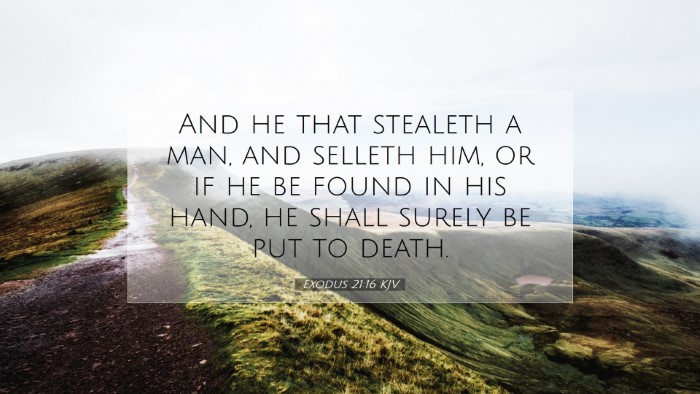Commentary on Exodus 21:16
Exodus 21:16 states, "He who kidnaps a man and sells him, or if he is found in his hand, shall surely be put to death." This verse addresses the heinous crime of kidnapping, underscoring the high value of human life and the serious repercussions for violating this sanctity. Drawing insights from various public domain commentaries, we can uncover a profound understanding of this scripture suitable for pastors, students, theologians, and Bible scholars alike.
Matthew Henry's Commentary
Matthew Henry emphasizes the moral and legal implications of kidnapping, highlighting that it is not only a crime against individuals but also a crime against society. He notes that the law given in this verse reflects God’s concern for justice and the protection of people's rights.
According to Henry, the penalty of death for kidnappers signifies the gravity of this sin and indicates that kidnapping is akin to murder, as it strips an individual of their liberty. He expounds that this commandment illustrates the sanctity of personal freedom, a fundamental principle of the law given to Israel.
-
Value of Human Life: The severe punishment signifies the high value God places on human life and liberty.
-
Divine Justice: It reflects God's nature as a just God who will not allow such injustices to go unpunished.
Albert Barnes' Commentary
Albert Barnes provides a practical perspective on this verse, acknowledging the historical context of slavery and servitude prevalent in ancient Israel and surrounding cultures. He highlights that while servitude was common, kidnapping diverged from the lawful means of acquiring servants, representing an act of desperation and dishonor.
Barnes asserts that the death penalty is a deterrent against such conduct, emphasizing that it was essential for maintaining order and upholding moral standards in the community. He argues that laws such as this were put in place to ensure that righteousness prevailed within the nation of Israel.
-
Historical Context: Understanding the culture and laws of ancient Israel gives deeper insight into the significance of this law.
-
Preventative Measures: The law serves as a strong deterrent against wrongdoing, fostering a just society.
Adam Clarke's Commentary
Adam Clarke views this verse from a theological standpoint, focusing on the Divine origin of the laws provided to Israel. He argues that they reflect God’s character and intentions for humanity, particularly concerning justice and personal integrity.
Clarke also expands on the implication of punishment, suggesting that human actions have inherent consequences and that justice must be meted out to protect the innocent. He mentions that God instituted such rigorous standards to foster a community that upholds dignity, respect, and justice for all.
-
Theological Implications: God's laws are reflective of His nature, aimed at establishing justice among His people.
-
Consequences of Sin: Clarke encourages understanding the reality of sin and its consequences, reinforcing the need for repentance and social responsibility.
Legal and Ethical Reflections
The verse also invites legal and ethical considerations, relevant to contemporary discussions on human rights and justice systems. The strict punitive measure against kidnapping raises questions about how modern societies perceive and prosecute such crimes.
-
Human Rights: The discourse surrounding Exodus 21:16 can bridge discussions about the sanctity of human life and the importance of legal protection against injustices like kidnapping and trafficking.
-
Restorative Justice: The church’s response to violations of justice can echo the principles found in this scripture, advocating for restorative justice that emphasizes rehabilitation over mere punishment.
Conclusion
In conclusion, Exodus 21:16 is a profound text that speaks to the heart of justice, morality, and divine law. Each commentator provides vital insights that contribute to a richer understanding of the value God places on human life and the societal responsibilities that arise from it. Through careful study and reflection, we can take these lessons into our own contexts, illustrating the timeless relevance of Scripture in addressing modern societal issues.


